#rashid khalidi
Text

finished reading thru The Hundred Years' War On Palestine: A History of Settler Colonial Conquest and Resistance by Rashid Khalidi and I cannot recommend it enough. A lot of people and, very likely, the average person not completely blinded by Islamophobia and/or USamerican/European/British exceptionalism are probably at least moderately sympathetic to the Palestinian cause but I don't know how many of us actually understand the degrees by which Israel is based in settler colonial ideology, how it has continually attempted to subjugate and ultimately eradicate the Palestinian people, and the degree by which the US and Britain (but mostly the US ever since the Six Day War in 1967) have been complicit in this continual genocide.
This book is an amazing comprehensive guide on understanding the conflict and I genuinely think you should give it a read (or listen) if you want to learn more. It is one thing to feel sympathy and to declare support for a cause, but I think it is important to take a step further and educate yourself more on it. A ploy I have seen frequently by zionists is to tell people to "educate themselves" before commenting on this genocide, hoping to instill doubt and encourage silence. Well, here is your chance to educate yourself! I'm obviously biased in favor of this one as it is the first major text on the Palestinian genocide that I have read, but I fully believe in its quality.
You can find this book online in PDF format or, if you prefer, you can purchase a physical copy from many of the large retail bookstores; Barnes & Noble in the US sells it, and so does Waterstones in the UK. There is also an official audiobook that you can either purchase through many of the major audiobook distributors (though I recommend avoiding Amazon if it can be helped), but you can also obtain it via other means if necessary. It's actually currently up on YouTube in its entirety, though I won't link it here in case it gets taken down. (It's really easy to search for, just type in the books title + 'audiobook' into your preferred search engine or on YouTube itself and you'll find it. It's about 10 hours long which is a reasonable length for an audiobook). I'll include a link in this post to an overview/lecture/dialogue with the author Rashid Khalidi on the contents of the book conducted at Brown University in 2020.
I do ask you read this book. I think a lot of people already are. I checked a couple of online libraries that have a limited number of audiobook copies that had all been checked out and that to me implies that people do want to educate themselves. There's a sizeable stack of these books at the local bookstore I ocassionally shop at, front and center on the table in the history and world affairs section. It's not hard to find. I hope you all have a good day or evening and I know that if we all take the time to educate ourselves further and approach this genocide with a deeper understanding, we may be able to do something about it. Emotional pleas are not enough, they must be informed ones as well.
#palestine#rashid khalidi#end occupation#end israeli occupation#israel#books#the hundred years' war on palestine
14K notes
·
View notes
Text
professor rashid khalidi on usa complicity in the ethnic cleansing of the palestinian people and our moral obligation to oppose with actions & words
note: recording is from november 1st. as of december 4th there are now 15000+ palestinians (6000 children) killed, 6000+ missing, 41000+ wounded
#but we must speak: on palestine and the mandates of conscience#rashid khalidi#video#palestine#free palestine#geopol
1K notes
·
View notes
Text
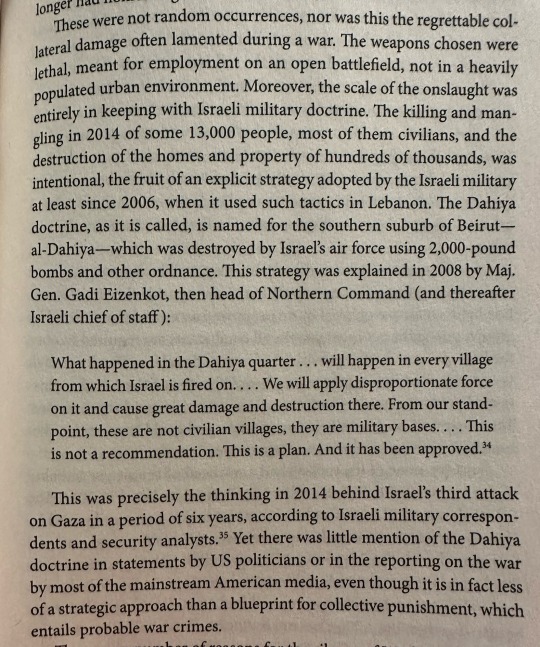
The Hundred Years’ War on Palestine by Rashid Khalidi
Ref.
234 notes
·
View notes
Text
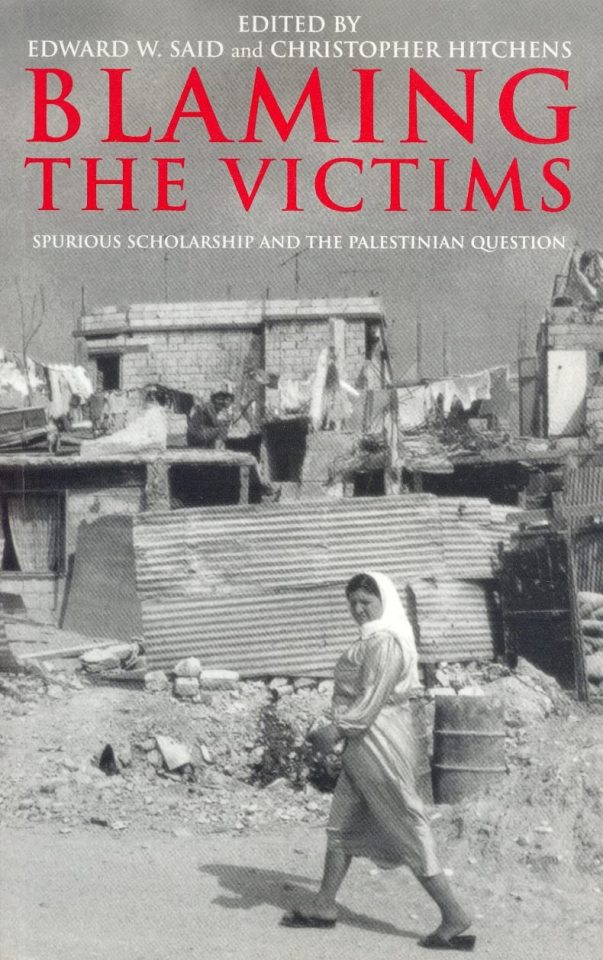
Blaming the Victims. Spurious Scholarship and the Palestinian Question, Edited by Edward W. Said and Christopher Hitchens, Verso, London and New York, NY, 1988
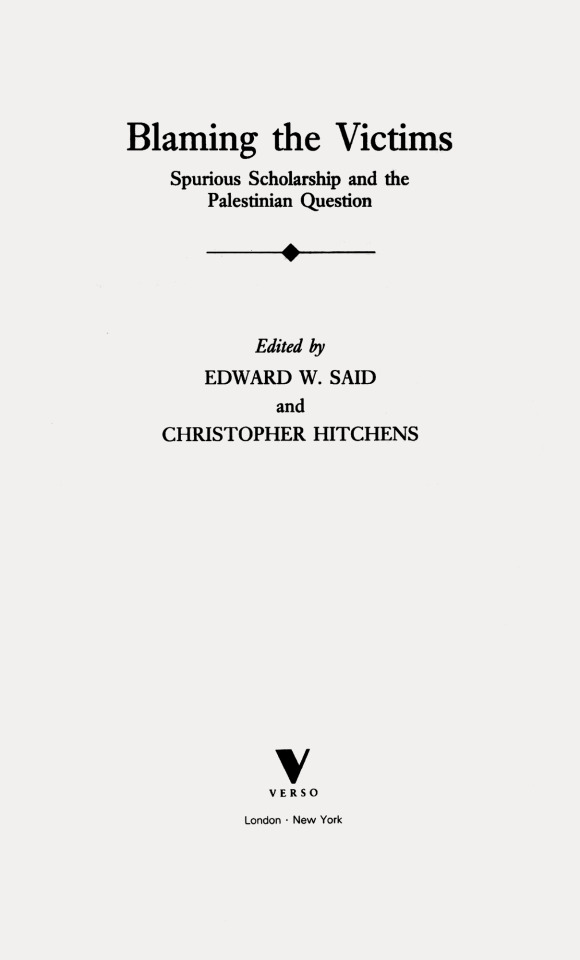
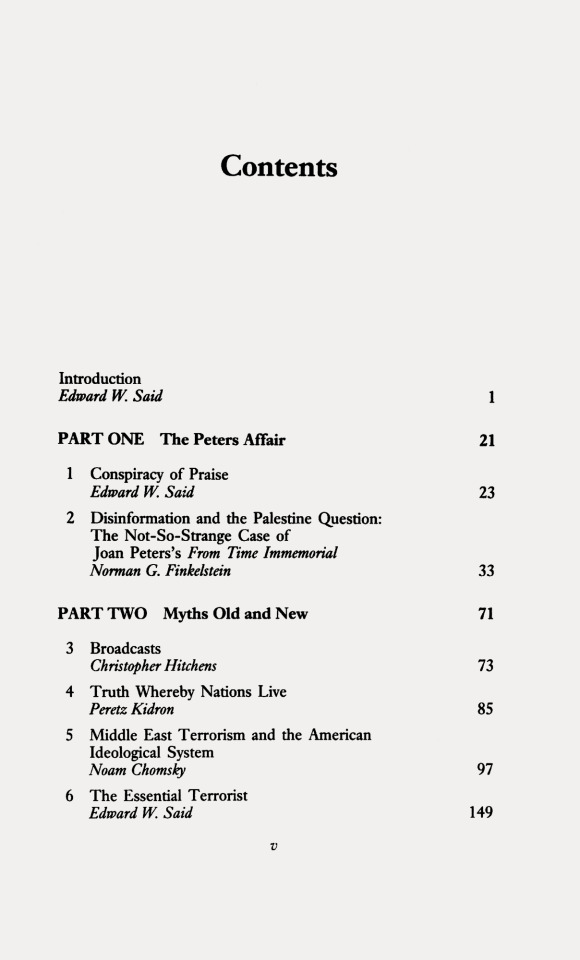
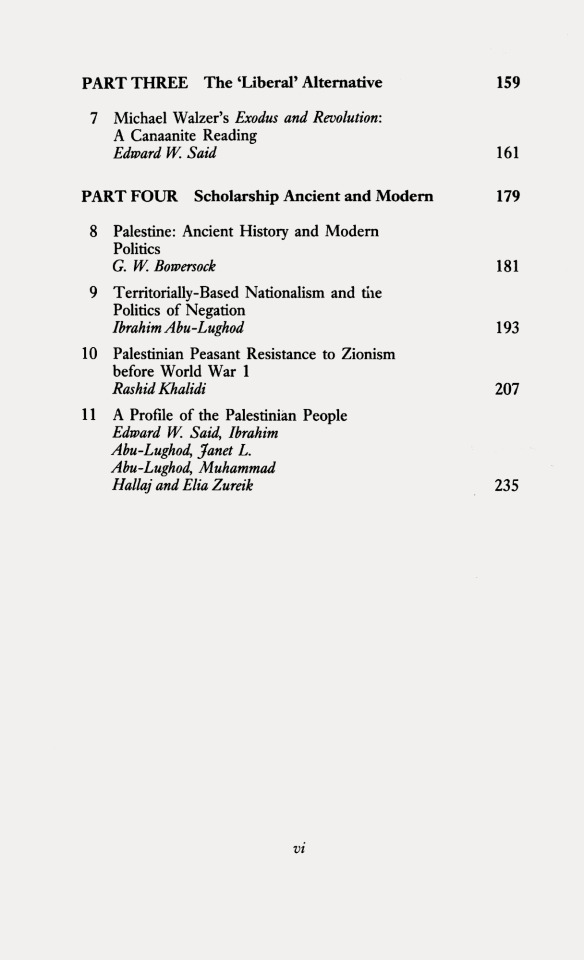
Contributors: Ibrahim Abu-Lughod, Janet L. Abu-Lughod, G.W. Bowersock, Noam Chomsky, Norman G. Finkelstein, Muhammad Hallaj, Rashid Khalidi, Peretz Kidron, and Elia Zureik
#graphic design#history#historiography#book#cover#book cover#edward w. said#edward said#christopher hitchens#ibrahim abu lughod#g. w. bowersock#noam chomsky#norman g. finkelstein#muhammad hallaj#rashid khalidi#peretz kidron#elia zureik#1980s
151 notes
·
View notes
Text
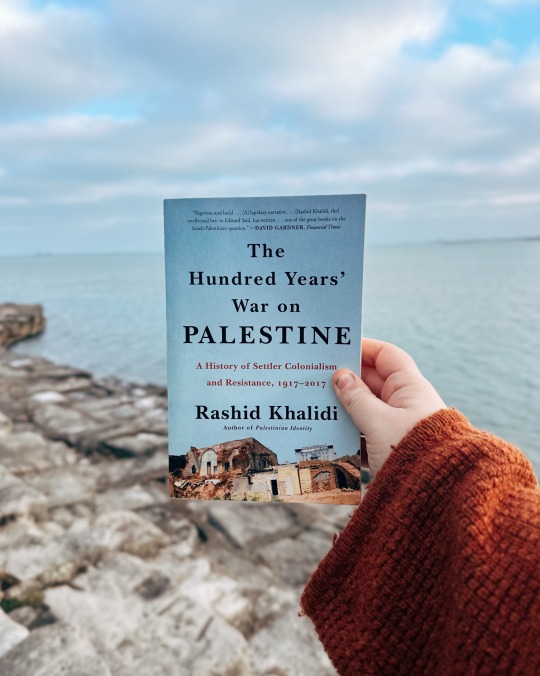
The Hundred Years' War on Palestine: A History of Settler Colonialism and Resistance, 1917–2017 by Rashid Khalidi is an excellent read that really helped change and refine my outlook on the systematic repression Palestine has faced, emphasizing that Israel was formed on the basis of colonial oppression, military force, and the near-total support of the United States.
More than anything else, this book emphasizes that nothing we're seeing today is new. Israel has a long, documented history of intentional disproportionality of violence and force in conflicts, of targeting civilians, refugee camps, and journalists, and of trying to stamp out the Palestinian identity through fierce propaganda work. It really helped contextualize the conflict for me.
For example, I learned that since 2006 the Israeli military has been operating under the "Dahiya doctrine," a strategy that one general explained as: "We will apply disproportionate force...and cause great damage and destruction there. From our standpoint, these are not civilian villages, they are military bases....This is not a recommendation. This is a plan. And it has been approved."
I was most affected by the proof of how absolutely the United States has been involved as a continual ally of Israel, letting the state of Israel set the terms of every negotiation or conflict. The book also makes the case that only when the US (rarely) intercedes, does Israel tend to back off from its ever-increasing shows of force against Palestine, which reinforces what I already believed, which is that our government must withdraw support of Israel's military advances and demand a ceasefire for there to be any hope of peace or pause in the genocide happening right now.
The book is not perfect. I often got confused about chronology. I understand that this is an analysis rather than a straightforward history, but Khalidi tends to circle back, dive into the past and back into the present, in a way that sometimes lost me. All that said, this book was an intensely valuable read for understanding the history of Palestine and of today's conflict, and I thank everyone who recommended it.
#the hundred years' war on palestine#rashid khalidi#palestine#free palestine#ceasefire now#my book reviews
56 notes
·
View notes
Text
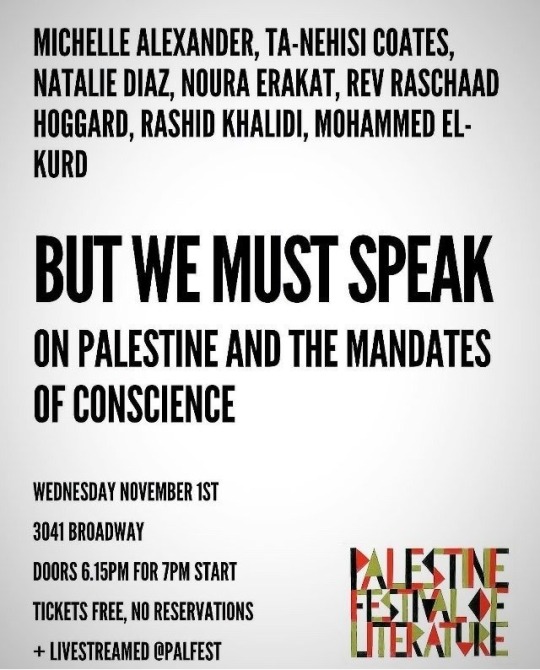
TONIGHT @ 7PM EST
The Palestinian festival of literature is hosting a panel titled “BUT WE MUST SPEAK ON PALESTINE AND THE MANDATES OF CONSCIOUS” featuring notable guests:
MICHELLE ALEXANDER - Black civil rights lawyer and author of “The New Jim Crow”
TA-NEHISI COATES - Black Award winning writer
NATALIE DIAZ - Award winning Mojave American poet
RASHID KHALIDI - Palestinian- American professor and historian
MOHAMMED EL-KURD - Notable Palestinian journalist, writer and poet.
There will be updates about the ongoing genocide of Palestinians, poetry readings, and additional discussions. Please attend!
Palfest will be streaming it live on their YouTube channel, link below:
#i highly respect all of their work it looks like it's gonna be really informative#palestine#ta nehisi coates#michelle alexander#natalia diaz#rashid khalidi#mohammed el kurd#free palestine
98 notes
·
View notes
Text
"Herzl replied—and quickly, in a letter on March 19. His letter was probably the first response by a leader of the Zionist movement to a cogent Palestinian objection to its embryonic plans for Palestine. Herzl simply ignored the letter’s basic thesis, that Palestine was already inhabited by a population that would not agree to be supplanted. Although Herzl had visited Palestine once, in an 1898 visit timed to coincide with that of German Kaiser Wilhelm II, he (like most early European Zionists) had not much knowledge of or contact with its native inhabitants.
Glossing over the fact that Zionism was ultimately meant to lead to Jewish control of Palestine, Herzl deployed a justification that has been a touchstone for colonialists and that would become a staple argument of the Zionist movement: Jewish immigration would benefit Palestine’s Indigenous inhabitants. “It is their well-being, their individual wealth, which we will increase by bringing in our own,” Herzl wrote, adding that “no one can doubt that the well-being of the entire country would be the happy result.”
Herzl’s letter addressed a consideration that Yusuf Diya had not even raised: “You see another difficulty, Excellency, in the existence of the non-Jewish population in Palestine. But who would think of sending them away?”
But Herzl had underestimated his correspondent. From Yusuf Diya’s letter, it is clear that he understood perfectly well that at issue was not the immigration of (as Herzl put it) “a number of Jews” into Palestine, but rather the transformation of the entire land into a Jewish state. Instead, Herzl offered the preposterous inducement that the colonization, and ultimately the usurpation, of their land by strangers would benefit the people of that country. Herzl’s reply to Yusuf Diya appears to have been based on the assumption that the Arabs could ultimately be bribed or fooled into ignoring what the Zionist movement actually intended for Palestine.
This condescending attitude toward the intelligence, not to speak of the rights, of the Arab population of Palestine was to be serially repeated by Zionist, British, European, and American leaders in the decades that followed, down to the present day. As for the Jewish state that was ultimately created by the movement that Herzl founded, as Yusuf Diya foresaw, there was to be room for only one people, the Jewish people. As for the others, “sending them away” was indeed what happened, despite Herzl’s disingenuous remark."
- Rashid Khalidi, The Hundred Years' War on Palestine: A History of Settler Colonialism and Resistance, 1917–2017
75 notes
·
View notes
Text
The Zionists’ colonial enterprise, aimed at taking over the country, necessarily had to produce resistance. “If you wish to colonize a land in which people are already living,” Jabotinsky wrote in 1925, “you must find a garrison for the land, or find a benefactor who will provide a garrison on your behalf.… Zionism is a colonizing venture and, therefore, it stands or falls on the question of armed forces.” At least initially, only the armed forces provided by Britain could overcome the natural resistance of those being colonized.
Rashid Khalidi, from The Hundred Years' War on Palestine: A History of Settler Colonialism and Resistance, 1917–2017
#palestine#rashid khalidi#colonialism#history#nonfiction#words words words#oppression#books and libraries#spilled ink#war on palestine#resistance#colonization#gaza
71 notes
·
View notes
Text

A Doonesbury cartoon strip by Garry Trudeau, reproduced in Rashid Khalidi, The Hundred Years' War on Palestine. The cartoon referenced the activities of Israel and its allies in Lebanon against Palestinian refugees and other civilians in 1982, but it remains just as relevant now.
#israeli occupation#lebanon#palestine#1982#2024#doonesbury#garry trudeau#cartoon#comic#art#rashid khalidi#the hundred years' war on palestine#books#history#current events
31 notes
·
View notes
Text
I feel like it's worth stating again by the way but when I ask that you read The Hundred Years' War on Palestine by Rashid Khalidi, it isn't so that you will be more convinced that what Israel is doing is bad. I am assuming you already know this. The point is that Zionists' biggest tool in their arsenal is the obfuscation of truth. Every moment this genocide is going on, the major news networks of your country (I'm talking mainly global north/"western"/english speaking countries as well as western europe) are feeding zionist propaganda in some form or other to your friends, family, neighbors, coworkers, bosses, employees, roommates, etc. We need to be able to combat this with fact, we need to convince them to read about Palestine as well, to learn its history and its peoples struggle. We cannot simply live while so many others die. We cannot horde the information we learn for ourselves. Knowledge must be shared and it must be done in a continuous, ongoing process if it is to matter. Please.
#palestine#free palestine#anti zionisim#israel#end israeli occupation#genocide#books#the hundred years' war on palestine#rashid khalidi
2K notes
·
View notes
Text

The Hundred Years’ War on Palestine by Rashid Khalidi
Ronald Reagan on the 1982 Israeli bombardment of Beirut
61 notes
·
View notes
Text
youtube
I want to introduce my handful followers to a face and voice of a name I hope you've heard of recently, Dr. Rashid al-Khalidi. He is not just an expert on Palestine, he is descended from a line of experts on Palestine. His book "The Hundred Years War on Palestine" is an extensive documentation of the displacement of Palestinians both literally and metaphorically in history, and the colonization of Palestine broadly from the 1917 Balfour declaration right up to 2017.
This is the lecture that created the name of the book and is thus an extremely valuable insight that I think might serve to make it easier to pick up a dense historical volume if you consume a video like this at your preferred pace first.
#history#Palestinian history#rashid khalidi#rashid al-khalidi#book recs#academia#lectures#palestinian authors#Youtube
13 notes
·
View notes
Text
hey one of my fav podcasts, American Prestige, has made available their specials with Rashid Khalidi going through the history of modern Palestine. There are 6 episodes available for free for this week.
11 notes
·
View notes
Text
Like the characters in the short novel Men in the Sun, by the Palestinian writer Ghassan Kanafani, however, they did not always find this route easy, for it often involved alienation, isolation, and, as when Palestinians attempted to cross frontiers with their refugee papers, even tragedy.
Rashid Khalidi, from The Hundred Years' War on Palestine: A History of Settler Colonialism and Resistance, 1917–2017
#palestine#ethnic cleansing#refugees#middle east#quotes#gaza#settler colonialism#palestinian literature#books and libraries#colonialism#ghassan kanafani#spilled ink#alienation#isolation#words words words#tragedy#rashid khalidi#nonfiction
29 notes
·
View notes